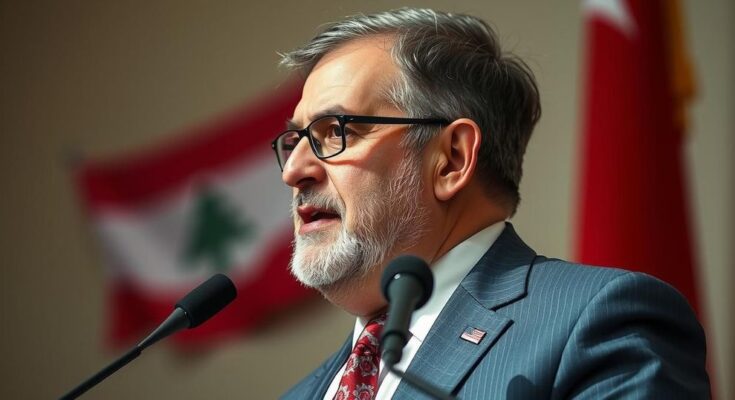Joseph Aoun has been elected as Lebanon’s new president, ending a two-year deadlock and fostering hope for recovery from economic and political crises. His presidency is seen as a shift toward stability, with commitments to reforms, national security, and the renewal of international relations. Analysts highlight the significance of this election amidst Lebanon’s complex political landscape, with implications for Hezbollah’s influence and regional dynamics.
Lebanon has successfully elected a new president, Joseph Aoun, ending a prolonged political stalemate that persisted for over two years. Aoun, a former army commander, received overwhelming support during the electoral session on January 9, 2023, shortly after a ceasefire was established between Israel and Lebanon. His election raises optimism for a departure from the nation’s protracted economic and political crises.
Political discord had led to a void in leadership following the expiration of Michel Aoun’s presidency in October 2022. During this period, Prime Minister Najib Mikati operated a caretaker government. Aoun’s ascension has garnered praise globally, with leaders from Saudi Arabia, France, and the U.S. among those congratulating him. Israeli Foreign Minister Gideon Saar remarked on X about hoping Aoun’s presidency will foster stability and positive relations.
In a televised interview, Hezbollah’s Wafiq Safa indicated that the party would not oppose Aoun’s nomination, suggesting a degree of political alignment. During his inaugural address, Aoun emphasized the need for a revamped political framework and highlighted legal reforms. He committed himself as a mediator dedicated to serving all Lebanese citizens and mentioned the necessity of appointing a cooperative prime minister.
Aoun articulated his determination to uphold state authority over weapon possession and to fortify military capabilities for border security. He underscored combating terrorism and upholding international resolutions as vital tasks ahead. Experts view Aoun’s election as a sign of revitalized political life in Lebanon, indicative of a shifting balance of power within both Lebanon and the broader geopolitical landscape.
Analysts noted Hezbollah’s supportive stance as a strategic move to secure international aid, vital for its constituencies amid Lebanon’s ongoing economic hardships. While Hezbollah may not relinquish its weapons immediately, the election signifies a decline in the group’s dominance in Lebanese politics. The impending challenge lies in forming an effective government capable of addressing both domestic issues and external security arrangements with Israel.
The new president stressed the urgency of reconstruction efforts following Israeli incursions in southern Lebanon and highlighted the importance of fostering external relationships for national benefit. He also opposed the settlement of Palestinian refugees within Lebanese borders but demonstrated a commitment to securing refugee camps and promoting dialogue with Syria on unresolved matters.
The pivotal test for Aoun will be establishing a functional government that can adeptly navigate the nation’s crises and handle ceasefire negotiations with Israel, crucial for preventing further conflicts. The interplay between internal governance and regional stability will significantly impact Lebanon’s trajectory and its prospects for recovery from enduring turmoil.
Lebanon has faced significant challenges due to prolonged political instability, economic decline, and security concerns, particularly following the failure to elect a president for over two years. The political system in Lebanon operates on a sectarian power-sharing basis, requiring specific religious groups to occupy key governmental positions. Joseph Aoun, with a military background, assumes the presidency amid complex internal dynamics and external pressures for stability and aid. His election is seen as a crucial step toward possible recovery and stabilization for the nation.
In summary, Joseph Aoun’s election as Lebanon’s president has sparked renewed hope for political stability and recovery from ongoing turmoil. His commitment to reform, focus on state authority, and international cooperation highlights the challenges ahead, particularly in government formation and managing relations with Israel. The political landscape is shifting, and Aoun’s leadership may play a pivotal role in steering Lebanon towards recovery and addressing both internal and external challenges.
Original Source: www.chinadailyhk.com




